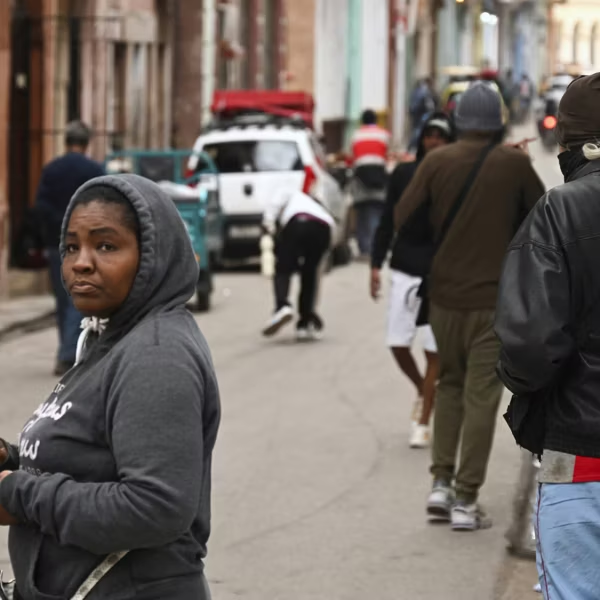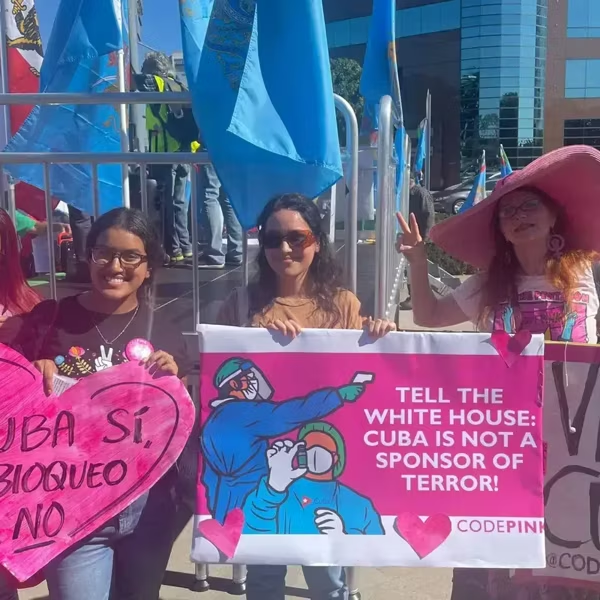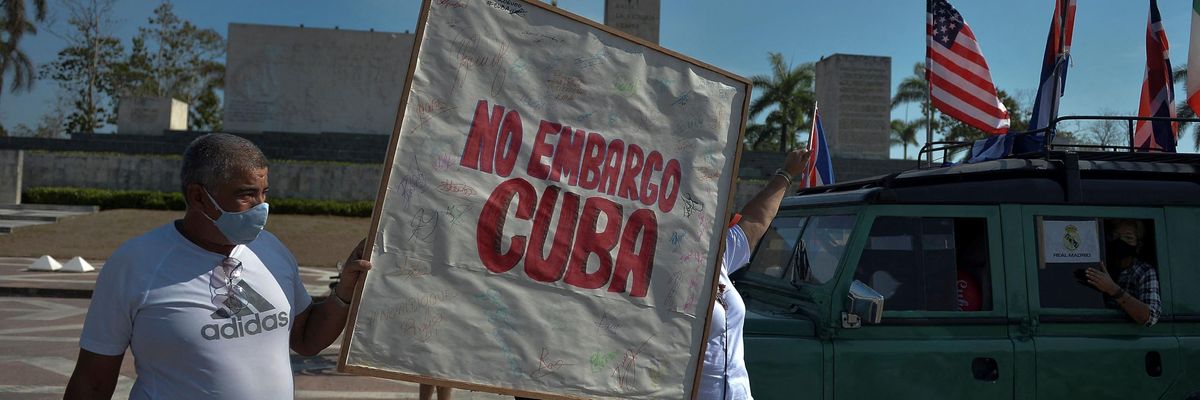While President Joe Biden campaigned on a pledge to reverse the "failed" policies of his predecessor that "inflicted harm on Cubans and their families," his administration--already under mounting pressure from progressives to deliver on that promise--announced new sanctions against Cuba on Friday.
Following Cubans' recent protests over shortages of food, medicine, and other essentials during the Covid-19 pandemic, the U.S. Treasury Department's Office of Foreign Assets Control sanctioned Cuba's main law enforcement body, Policia Nacional Revolucionaria (PNR), as well as its director and deputy director, Oscar Callejas Valcarce and Eddy Sierra Arias.
The Treasury Department said in a statement announcing the moves that "the Cuban regime deployed the PNR... to suppress and attack protesters." In the midst of these protests, progressives have highlighted the role of the United States' decadeslong blockade, and called out U.S. media for how it has handled that history and its present-day effects.
"Cuba has a population of 11 million people. The protests pale in comparison, both in terms of turnout and in state repression, to mass mobilizations that have rocked Colombia, Haiti, Chile, Ecuador, and other Latin American countries over the past few years--or even Portland, Oregon, or Ferguson, Missouri," Medea Benjamin and Leonardo Flores of the U.S. anti-war group CodePink wrote for Common Dreams this month. "Moreover, U.S. media have paid little attention to the counterprotesters, who have gone out into the streets to express their support for the government and Cuban Revolution."
Benjamin and Flores continued:
The protests should also be understood in the context of a brutal economic war waged by the United States against the island nation for more than 60 years. This was laid out clearly by the U.S. Deputy Assistant Secretary of State in 1960, when he explicitly called for "denying money and supplies to Cuba, to decrease monetary and real wages, to bring about hunger, desperation, and overthrow of government." This strategy has failed in its goal of regime change for decades, and it is unlikely to be successful now.
...While the blockade has been in place for over six decades, it was tightened in significant ways under the Trump administration's policy of "maximum pressure." This strategy targeted Cuba's tourism, energy, and other key economic sectors. It even restricted the amounts of money Cuban Americans can send home and closed the Cuban branches of Western Union, the main vehicle for sending remittances. These policies have had a disastrous impact on the Cuban economy, especially when the Covid-induced shutdown of the tourist industry has deprived the island of billions of dollars and thousands of jobs. For its part, the Biden administration has been "reviewing" its Cuba policy for six months, all the while continuing Trump's strategy of economic warfare that is designed precisely to create the shortages Cubans are now experiencing.
As Belen Fernandez put it in a piece for Al Jazeera on Thursday: "Cuba's dire situation has just about everything to do with United States interference... particularly the six-decades-long blockade that, under international law, technically qualifies as an act of war."
"Although mainstream articles do often mention U.S. sanctions," Fernandez wrote of U.S. newspapers, "they almost never convey their comprehensively asphyxiating nature--context without which none of Cuba's contemporary history can begin to be understood."
The Biden administration's new sanctions come after Democratic leadership in the U.S. House of Representatives blocked an amendment from Rep. Jesus G. "Chuy" Garcia to roll back Trump's $1,000-per-quarter limit on remittances that people in the United States can send to family in Cuba.
"The United States has no business preventing Cuban Americans from sending lifesaving remittances to their families, especially while so many lack adequate food, water, and medicine," Garcia told The Nation. "We must end our decadeslong blockade against Cuba, which has led to desperation instead of democracy. Restoring remittances is an important first step."
Noting that Trump not only restricted remittances, but also tightened sanctions and barred most travel to Cuba, The Nation reported Wednesday, before the Treasury Department's latest announcement:
Now, after months of ignoring Cuba, Biden has embraced Trump's approach, slapping on additional sanctions last week and defying the progressive voices in his party calling for relief.
Biden's tougher line on Cuba, and congressional Democrats' complicity, is better understood in the context of domestic politics, not foreign policy. It's largely driven by the desire to placate Cuban Americans in Florida, who weren't planning on voting Democratic in the first place. Most Cuban American voters nationwide identify as Republican, a 2020 Pew Research Center study found. And for years now, Republicans have outperformed Democrats in Florida on things like ground game and voter registration. So Democrats hold relief hostage, inflicting pain on countless ordinary Cubans in the process, for political gain that doesn't actually materialize.
A senior Biden administration official told CNN that along with the new sanctions--on top of those announced last week--the U.S. government is pursuing new "efforts to improve internet connectivity" on the island, and the president was set to discuss both topics in a meeting with Cuban-American leaders.
CodePink's Benjamin, in a Friday tweet about the latest sanctions, nodded to the argument that the Biden administration's policies are intended to appease Democrats in South Florida.
Benjamin is among hundreds of academics, activists, artists, clergy, musicians, politicians, and other public figures who have signed a public appeal to Biden calling on him to immediately lift Trump's 243 unilateral and additional sanctions.
The open letter urging Biden to "Let Cuba Live!" appeared as an advertisement in last Friday's edition of The New York Times and as symbolically represented in Washington, D.C.'s Lafayette Square that same morning.
The letter encourages the U.S. president to "reject the cruel policies put into place by the Trump White House that have created so much suffering among the Cuban people," emphasizing that "while the Covid-19 pandemic has proven challenging for all countries, it has been even more so for a small island under the heavy weight of an economic embargo."
"We find it unconscionable, especially during a pandemic, to intentionally block remittances and Cuba's use of global financial institutions, given that access to dollars is necessary for the importation of food and medicine," the letter says, calling on Biden to "begin the process of ending the embargo and fully normalizing relations between the United States and Cuba."
Last month, continuing a nearly three-decade trend, 184 members of the United Nations General Assembly voted in favor of a resolution demanding an end to the U.S. blockade on Cuba. Only the United States and Israel voted against it, while Brazil, Colombia, and Ukraine abstained.
"The embargo is not only illegal and inhumane," Progressive International said at the time. "It is incredibly unpopular."




